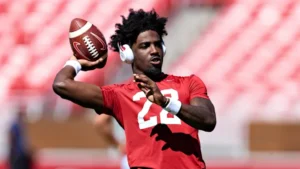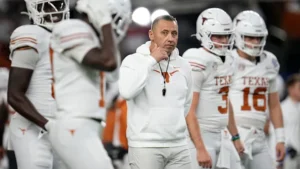
Tennessee Dealt Brutal Blow in College Football Transfer Portal Shakeup
The Tennessee Volunteers have been trending upward in recent seasons under the leadership of head coach Josh Heupel, establishing themselves as a serious contender in the SEC and a program capable of building a national championship resume. But the recent developments in the college football transfer portal have sent a shockwave through Knoxville, dealing Tennessee a brutal and unexpected blow that could reshape its roster and outlook for the 2025 season.
College football’s transfer portal era has dramatically changed how rosters are built, and even the most stable programs aren’t immune to its chaos. This offseason, Tennessee learned that lesson the hard way. The Vols, who have been riding high on strong recruiting classes and momentum from back-to-back bowl appearances, suddenly found themselves on the wrong side of portal movement. A combination of high-profile departures and untimely exits have left Tennessee scrambling to reevaluate its depth, leadership, and potential starting lineup before summer camp begins.
At the center of this transfer portal turmoil is the shocking decision of multiple key contributors to leave the program. The most notable and painful departure came from a player many expected to anchor the team’s defense this fall. Junior linebacker Elijah Herring, one of the rising stars in the SEC and a player praised for his toughness, motor, and leadership, officially entered the portal just days after spring practice wrapped up. Herring led the team in tackles in 2024 and was expected to be the centerpiece of Tennessee’s front seven. Losing him not only guts the Vols’ defense from a talent perspective but also robs it of an emotional leader and on-field communicator.
Sources close to the program indicate that Herring’s departure was not entirely anticipated. Though portal rumors always circulate, Tennessee believed it had built enough trust and provided enough opportunity to retain its core defensive players. But NIL opportunities, shifting personal priorities, and a changing college football landscape continue to pull players in unexpected directions. Herring is already generating interest from multiple Big Ten and ACC programs, and the Vols will now be forced to find a replacement in a unit already dealing with other transitions and new faces.
Herring’s exit would have been bad enough, but he wasn’t the only key contributor to leave. Defensive back Jourdan Thomas, who was expected to play a significant role in the secondary after earning valuable playing time last season, also entered the portal. His departure adds to the growing list of concerns in Tennessee’s pass defense, which was inconsistent at times in 2024. While the coaching staff brought in some new faces through recruiting and previous portal cycles, depth is now a real concern, especially in a league where defensive backs are constantly tested by elite receivers.
Offensively, Tennessee has managed to retain most of its key weapons, including the highly anticipated quarterback Nico Iamaleava—now a sophomore and the undisputed leader of the offense. Still, the departures on the defensive side of the ball threaten to throw off the balance Tennessee needs to compete with the likes of Georgia, Alabama, and LSU. Losing high-impact defenders not only impacts game-day performance but also changes how the coaching staff approaches strategy, practice reps, and personnel development.
Another layer of difficulty is the timing of the departures. Coming after spring ball, the Vols are in a tough position. Many of the best available players in the portal have already found new homes, and bringing in instant-impact replacements becomes increasingly difficult as the calendar pushes toward summer. Coaches are now forced to dip into the secondary wave of transfers or rely more heavily on unproven younger players. That’s a gamble in the SEC, where inexperience can be exposed quickly and mercilessly.
This portal cycle was also particularly chaotic across the country, with several big-name programs experiencing unexpected roster turnover. In that sense, Tennessee isn’t alone—but the timing and the players involved make this stretch particularly painful. The Vols’ 2025 schedule doesn’t allow much room for error either. Early matchups against high-powered offenses mean Tennessee will need to figure out defensive roles quickly or risk falling behind in the standings before October.
What makes this setback even more frustrating for Tennessee fans is that it comes just when things were starting to click. Under Heupel, the Vols have shed the inconsistency that plagued them during the post-Phillip Fulmer era. They’ve turned Neyland Stadium back into one of college football’s most intimidating venues, they’ve recruited at a high level, and they’ve injected much-needed swagger back into the program. But college football in 2025 doesn’t reward stability the same way it once did. Instead, roster volatility is the new normal, and Tennessee is finding that out in real time.
The coaching staff now faces a critical stretch. Can they find the right players to plug the holes left behind? Can they keep the remaining roster intact and avoid further exits before the summer session begins? Perhaps most importantly, can they turn this setback into an opportunity for younger players to step up and emerge as the next wave of stars in orange and white?
One area where Tennessee may find comfort is its strong culture. Heupel has emphasized team-first values and built trust with his players. Even amid departures, many of the team’s veterans have doubled down on their commitment, posting supportive messages and emphasizing unity in the locker room. That kind of internal cohesion could be what separates Tennessee from other programs dealing with similar losses. But culture alone doesn’t win SEC games—talent and execution do.
There’s also hope that the portal, as brutal as it’s been, can still provide some late relief. The second transfer window, although smaller and more limited, may still produce a few quality options who could be lured to Knoxville with the promise of immediate playing time in a top-tier league. Additionally, junior college talent and late academic qualifiers could give Tennessee other options if it can think creatively about roster construction.
Recruiting has been another strong point under Heupel, and the incoming freshman class is deep at several positions. While relying on true freshmen in the SEC is always risky, there are a handful of newcomers who may now find themselves with an opportunity to contribute sooner than expected. Linebacker Edwin Spillman, for instance, was already impressing coaches during spring camp and may now find his path to the field fast-tracked. Similarly, safety Boo Carter—another prized in-state recruit—is likely to play a bigger role in the defensive backfield given the reshuffling.
In the broader context, Tennessee’s experience this offseason is a reminder that in college football’s new world, no program is immune to sudden and impactful change. The transfer portal giveth and taketh, and even the most promising teams can see their plans derailed in a matter of days. For the Vols, this is a test of resilience, coaching acumen, and program stability.
It’s not the end of the world in Knoxville—but it is a clear sign that Tennessee’s path back to SEC dominance won’t be without its obstacles. Every team has to weather adversity, and how the Volunteers respond to this moment will go a long way in defining their 2025 season. If they can rally, adapt, and fill the gaps, this could ultimately become just a temporary storm on a much longer journey back to national prominence.
But make no mistake—this was a gut punch. A harsh reminder of how quickly fortunes can shift in the era of open transfers and NIL leverage. Tennessee’s response now becomes one of the most important storylines to watch as the 2025 college football season approaches.





